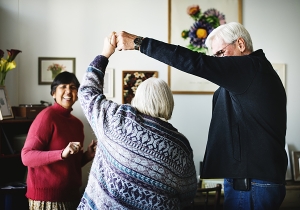Flinders University Rural Health SA commenced an ambitious national dementia research project in 2017.
The project seeks to identify key drivers of a personalised care, and use co-design principles to implement and evaluate a personalised model of care incorporating music/art and movement interventions for residents with dementia in five rural aged care homes in South Australia and Far North Queensland.
The project involves the creation of a low stress organisational environment and culture based on the Progressively Lowered Stress Threshold (PLST) framework for non-pharmacological care of dementia (Hall et al, 1987). The PLST model of care is shown to improve sociability, sleep, and dietary intake and reduce agitation (Tedstad et al 2014). Harmony in the Bush expands the PLST approach, which uses a psychoeducation intervention to co-design personalised care with residents and/or their relatives, and aged-care staff by including personalised music/arts intervention. Six contracted musicians, residing within each participating aged care home, were involved in co-designing and delivering intrectaive music sessions to small groups of residents. 
Specific Aims of the Research
- Train aged care staff:
- In the theory, use and importance of the PLST model principles and non-pharmacological therapies/interventions such as personalised preferred music, arts and movement, and community engagement programs
- To plan individualised care that eliminates the stressors known to cause disturbed behaviours in residents with dementia.
- Identify forms of music and art activities preferred by residents with dementia before the onset of their dementia condition, and co-design personalised care plans.
- Implement co-designed personalised PLST-based care plans, and the integrated PLST Plus music and art/movement programs care plans to care for residents with dementia.
- Evaluate the effectiveness of the co-design personalised care plans with and without music, art or community engagement interventions, by analysing its impact on patient behavioural outcomes, staff stress level, and institutional culture change.
Participating Residential Aged Care Homes
The project is being conducted in the following Residential Aged Care Homes:
- Ozcare Port Douglas Aged Carein Port Douglas, Far North Queensland
- Mutkin Residential and Community Aged Care in Yarrabah, Far North Queensland
- Resthaven on Quarry Aged Care in North MacKay, Far North Queensland
- Barmera Aged Care in Barmera, South Australia
- Tanunda Lutheran Home in Tanunda, Barossa Valley, South Australia
Musicians and Artists
- Ms Visnja Prtenjaca – Port Douglas, Queensland
- Mrs Elverina Johnson – Yarrabah, Queensland
- Mrs Tania De Brincat (Griffin), Mackay, Queensland
- Ms Katherine Vowles, Renmark, South Australia
- Mr Mick Scordo, Berri, South Australia
- Mrs Robyn Mitchel, Barossa Valley, South Australia
Associated Stakeholders/Partners
The following key stakeholders are involved:
- The Australian Government Department of Health(Funding Institution)
- The Flinders University of South Australia(Project Sponsor)
- Flinders Rural Health South Australia(primary site for project management/ implementation)
Intervention Outcomes
The project was a rewarding experience for the Flinders researchers as they witnessed significant reduction in behavioural and psychological symptoms of people with dementia. Carers developed in-depth knowledge about dementia care that is personalised and supportive to residents and their families, and the positive changes in organisational culture translated to reduced stress in staff. The researchers showed that personalised models of care, including music activities based on the principles of the PLST model, are feasible and highly effective in rural aged care settings.
Flinders University Investigators
Dr Vivian Isaac, Dr Abraham Kuot, Dr Mohammad Hamiduzzaman